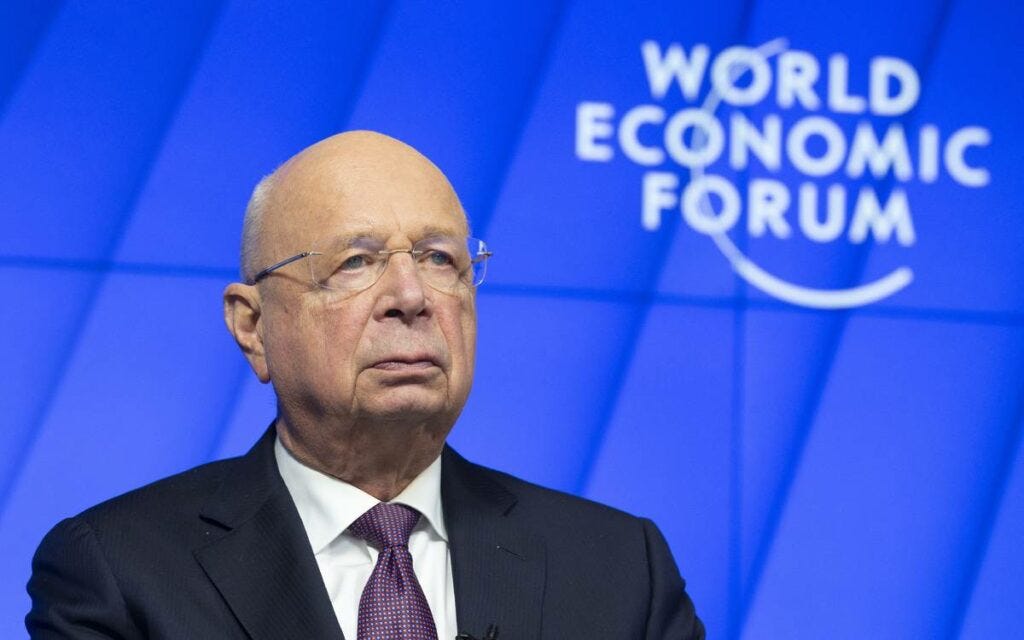Klaus Schwab generated headlines last month with his announcement of “retirement” from the World Economic Forum (WEF). This is more appropriately described as “stepping back from the limelight” for Schwab, now 86, as he intends on being in the wings directing WEF’s unfolding plot from a more discreet position.
The founder and executive chairman of the WEF is transitioning from his day-to-day management to a non-executive role of the organization that he has been directing for 50 years. Schwab’s move is to take place before January 2025, the next WEF annual gathering of corporate leaders, politicians, and global technocrats at Davos Switzerland.
Schwab has indicated that his transition is part of a multiyear plan that will see the WEF management structure being led by a president and managing board, of which he will assume chairmanship. He has not publicly identified his successor, the new face of the organization, who will be responsible for taking up the WEF mission for global influence.
Here is a brief synopsis on the WEF and another on The Great Reset -- necessary background to understanding Canada’s involvement with the global agendas.
The WEF
The WEF has been Schwab’s life-project. The international organization was established in 1971 and it is mostly known for its annual summit for world leaders in the Alps sky town of Davos. The WEF website states, “The Forum engages the foremost political, business, cultural and other leaders of society to shape global, regional and industry agendas.”
The Davos meetings were first convened to allow European business leaders and government officials to discuss their economic competitiveness with the United States. Through the years, the focus of the meetings morphed to include elite business and political leaders from around the world to discuss emerging issues and possible coordinated responses to them.
In the early 70’s Schwab wrote the original Davos Manifesto, and WEF officials make the exalted claim that, “Stakeholder capitalism was born.” Through the decades, Schwab has been central in establishing a global dialogue on creating a world order in which international bodies operating with the United Nations (U.N.) oversee global agendas. The establishment and review of these agendas are the focus of the Davos summits.
An important sidebar to the Davos summits is the Young Global Leaders and Global Shapers programs, in which participants are indoctrinated on the WEF agenda and schooled on how to effectively implement it. Many Young Global Leaders are now elected politicians and senior bureaucrats in governments. The Global Shapers program today has more than 1,300 youth activists operating in 450 cities around the world advocating through “grassroots movements” for societal change and climate change solutions.
Essentially, the WEF is a giant thinktank that leads directed discussions of politicians, corporate leaders, government officials, civil society groups and NGOs, and uberwealthy individuals, such as Bill Gates, George Soros and Larry Fink. The WEF fosters greater networking and encourages a specific set of geopolitical and social policies to be implemented worldwide.
The Great Reset
The Great Reset is a publication that was released in 2016. In the book, Schwab argues that capitalism is dead and every aspect of society will need to be refashioned. Schwab’s prescription is to move nations’ economies and corporate structures from “shareholder capitalism to stakeholder responsibility.” Governments and international corporations are to be regulated and measured by WEF environmental, social and governance metrics, and they will be managed by the U.N.
In July 2020, the WEF published a second book co-authored by Schwab entitled, “COVID-19 – The Great Reset.” In this thesis, Schwab describes how the COVID pandemic has disrupted economic and social order around the world. He posits that the health crisis provides an opportunity “to create a more inclusive, resilient and sustainable world going forward.” Schwab then advances a WEF plan to alter nation states and their institutions over a ten year period so that, by 2030, countries will be in adherence with U.N. economic and social governing bodies.
Schwab’s 2020 book concludes: “In short, we need a ‘Great Reset’ of capitalism. We must build entirely new foundations for our economic and social systems.” He follows this up in 2021 with a document Davos Manifesto, which encourages WEF participants to take COVID-19 as an opportunity to take advantage of the economic disruption caused by the coronavirus, “We should seize this moment to ensure that stakeholder capitalism remains the new dominant model.”
Through this period the WEF fully aligned its activities with those of the U.N. technocrats who were focused on advancing the objectives set out in U.N. Agenda 2030 (more on this in my next column).
Members of the Trudeau government play key roles in the WEF. And this is where we will pick up the exploration of the WEF agenda, Canada’s participation in that agenda, and the potential impact the globalists’ plans will have on Canadians.





